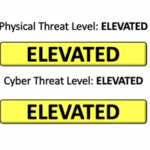
Faith-Based Daily Awareness Post 10 October 2025
Faith-Based Security Headlines
These updates are shared to help raise the situational awareness of Faith-Based organizations to best defend against and mitigate the impacts from all-hazards threats including physical security, cybersecurity, and natural disasters.
Sen. Peters tries another approach to extend expired cyber threat information-sharing law
Senator Gary Peters has introduced new legislation called the Protecting America from Cyber Threats (PACT) Act aimed at renewing and renaming the expired Cybersecurity Information Sharing Act of 2015 (CISA 2015). The original law had provided liability protections to entities sharing cyber threat information with each other and with the federal government, and many in industry viewed it as one of the more successful U.S. cyber laws. Peters’s bill would extend those legal protections for ten years and make them retroactive to cover the lapse that began October 1, addressing concerns that organizations might reduce or halt information sharing during the gap. He has pushed back on objections particularly from Senate Republicans like Rand Paul who conflate the CISA name with the federal agency CISA (Cybersecurity and Infrastructure Security Agency) or seek to insert speech-related amendments. Though Peters had previously sought shorter renewals, he contends that long-term certainty is essential for stable cybersecurity operations. He and his allies are working to rally support and navigate Senate procedures, with the expectation that, if the PACT Act reaches the floor it would pass by a wide margin.
Analyst Comments: The expiration of the CISA 2015 Act poses significant legal and operational risks from both government and private sector partners. Without the liability protections the law provided, many organizations may hesitate to share cyber threat intelligence out of fear of legal exposure or regulatory repercussions. Senator Gary Peter’s PACT Act is crucial to ensure stability and confidence in cybersecurity coordination. Overall, industry and policy experts largely agree that restoring clear legal protections for information sharing is essential to maintaining a resilient national cyber defense posture.
Exclusive: Trump administration sought to block Muslim groups from receiving security funding
According to a CNN report, senior officials at the Department of Homeland Security (DHS) proposed earlier this year that the Federal Emergency Management Agency (FEMA) block millions of dollars in security grants to Muslim organizations, a move FEMA leaders warned could be discriminatory and unlawful. Although the idea was initially dropped, six months later, dozens of Muslim groups lost eligibility for FEMA’s Nonprofit Security Grant Program after DHS and the Department of Government Efficiency (DOGE) alleged ties to terrorism. FEMA insiders questioned these allegations, calling them weakly supported and potentially a pretext for politically motivated funding cuts. DHS denied targeting Muslim groups or making decisions based on religion stating that only organizations with verified terrorism links were defunded. However, several Muslim organizations, including the Islamic Society of North Amerca, rejected the accusations and said they were unfairly singled out.
National Guard To Hit Memphis Streets Today
A federal judge has temporarily blocked President Trump’s plan to deploy a National Guard troop to Chicago, ruling that the deployment violated the Tenth and Fourteenth Amendments and the Posse Comitatus Act, noting a lack of credible evidence of rebellion in Illinois. At the same time, a coalition of journalists, protesters, and clergy filed a lawsuit against the Trump administration, accusing federal agents of a “pattern of extreme brutality” during protests outside the ICE facility in Broadview Illinois. The complaint includes allegations that federal officers used tear gas, pepper balls, rubber bullets and other force against peaceful demonstrations and media covering the events, even targeting a Chicago-area pastor while he was praying. In response, U.S. District Judge Sara Ellis issued a 14-day restraining order barring federal agents from using physical force, riot control weapons, or making arrests of nonviolent protesters or journalist, absent probable cause, and required agents to wear visible identification. Meanwhile, in Memphis, National Guard troops began patrolling as part of the Trump administration’s broader effort to deploy military forces in U.S. cities to address crime. While the Illinois deployment was restrained by the court, the Memphis deployment proceeded under the authorization of Tennessee’s governor.
FB-ISAO will continue to provide the latest updates on the ongoing Nation-wide crime and immigration crackdown initiated by the Federal government, often against the wishes of local authorities. These updates are being shared to provide situational awareness, particularly for those HOWs in directly impacted areas to understand the potential for disruptive activities and potential civil unrest. HOWs that may be concerned about Civil Unrest activity in their local jurisdictions are encouraged to review CISA’s “Protecting Infrastructure During Public Demonstrations” resource.
Video: How the latest deepfake scam can cheat companies out of millions
The CNN segment and related cybersecurity commentary highlight a disturbing rise in deepfake scams that now use live video and audio impersonations during meetings or calls. One major case involved an engineering organization that was tricked into transferring $25 million after scammers used AI to deepfake members of its finance team during a Zoom call. Similar attacks have been documented globally, including a $35 million voice-cloning heist reported by Forbes and an attempted deepfake impersonation of the Wiz CEO, covered by TechCrunch. These incidents reveal a growing trend where criminals replicate the likeness or voice of executives to trick employees into sending money, credentials, or sensitive data.
Experts including those featured on CNN’s Clare Duffy segment warn that these “live” AI attacks are becoming increasingly realistic and harder to detect. Some recommend using verbal passphrases among colleagues, friends, or family to verify identity during unexpected requests. However, experts also caution that in high-stress scenarios like when a deepfake loved one appears distressed people may forget such passphrases because the brain’s amygdala can override rational recall. Instead, cybersecurity professionals suggest using a second channel of communication (such as texting, chatting, or messaging through a verified app) while staying on the line to confirm authenticity before acting on any urgent request. The message is clear: individuals and organizations must adopt a mindset of “polite paranoia” verifying identities even when someone looks or sounds completely real. Analysts predict that while AI voice clone scams are already widespread, live video deepfake attacks could become common within the next year, making proactive training and awareness critical for both professional teams and families alike.
Analyst Comments: Deepfake scams are an emerging and serious threat. Exploiting trust in what people see and hear to trick victims into sending money or sensitive data. Cases like the $25 million Arup incident show that even experienced teams can be deceived. The importance of multi-channel verification confirming requests through a separate method because emotional or high-pressure situations can impair judgment. The predict that as AI tools become more advanced, these attacks will grow more frequent and sophisticated, making awareness training and proactive precautions essential for both organizations and families.
More Faith-Based Stories
- Judge orders restrictions on federal tactics against ICE protesters after Chicago-area pastor shot with pepper balls
- Pastor shot in the head by ICE agents sues Trump administration over First Amendment threats in Chicago
- Judge bars ICE from taking some violent actions against religious activists, journalists
- What REALLY Happened at the Michigan LDS Church Shooting?
- Police arrest suspect in several incidents of antisemitic vandalism in Washington state
- Lawsuit: LDS church allegedly allowed convicted sexual offender access to children
- Bulgaria probes ‘Nazi’ graffiti scrawled on Varna synagogue, Holocaust memorial vandalized
- Kentucky man whose Halloween display allegedly depicted bodies of local officials is accused of terroristic threats
- America’s New Age of Political Violence
- Coastal storm to hammer US East Coast with flooding, wind and erosive surf
- Pacific tropical rainstorms to unleash major flash flooding in southwest US
- Covid Shots Are About to Be Widely Available Again
- Israeli military says ceasefire takes effect in Gaza, raising hopes for ending the war
More Security-Focused Content

The FB-ISAO’s sponsor Gate 15 publishes a daily newsletter called the SUN. Curated from their open source intelligence collection process, the SUN informs leaders and analysts with the critical news of the day and provides a holistic look at the current global, all-hazards threat environment. Ahead of the daily news cycle, the SUN allows current situational awareness into the topics that will impact your organization.


